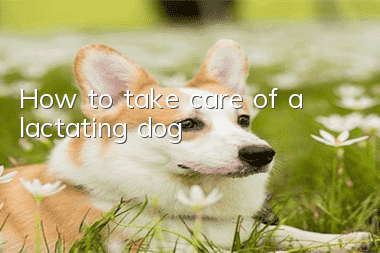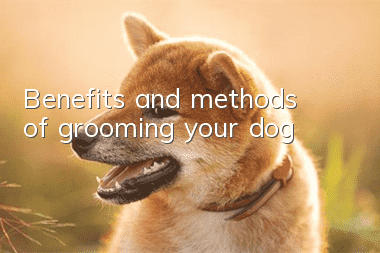How to take care of a lactating dog

Methods to take care of lactating dogs
1. If the puppies are with the mother dog, the sight and hearing of the newborn puppies will be impaired. If the puppies are not fully developed, you should pay attention to taking care of the mother dog, pay attention to the wind protection and heat preservation of the environment, and pay attention to the physical inflexibility of the puppies to avoid being crushed or trampled to death by the mother dog.
2. Be sure to eat breast milk. Breast milk contains enough necessary nutrients, and breast milk can enhance puppies’ antibodies.
3. After five days of birth, you can take both the mother dog and the puppies outside to bask in the sun, usually twice a day, for about half an hour each time, to ensure that they can breathe fresh air.
4. When they are 14-16 days old and just open their eyes, they have blurred vision and are not adaptable to strong light, so they cannot be raised in an environment with strong light. In about a month, the puppy's vision and hearing are as developed as those of an adult dog. Note that you cannot force the dog to open its eyes, just open them yourself.
5. If the puppy accidentally gets wet, be sure to wipe it dry, blow dry, and keep it warm to avoid catching a cold. Trim your toenails every 20 days or so to avoid injuring the mother dog while breastfeeding.
6. Use deworming net to deworm for 30 days. When one month old, the dog should be vaccinated against canine distemper, canine infectious hepatitis, canine parvovirus, rabies virus and other infectious diseases, and then once a month.
7. As the puppies grow up, breast milk can no longer meet their needs. Complementary food must be appropriately added, with animal feed as the mainstay and plant feed as the supplement. It is also necessary to choose easy-to-digest food.
Food suitable for lactating dogs
1. Feed mainly high-nutrition puppy food or lactation-specific food.
2. You can also feed nutritional supplements such as nutritional paste, chicken breast, goat milk powder, etc.
3. Vitamins, inorganic salts and calcium are also needed because the consumption of these nutrients is relatively high during lactation.
4. Probiotics also need to be supplemented. Female dogs after giving birth spend most of their time lying still due to physical exertion and need to feed puppies, so they are prone to gastrointestinal indigestion.
5. It is also necessary to optimize the feeding method and try to adopt the feeding principle of small meals and frequent meals to reduce food stimulation to the dog mother and increase the digestion and absorption rate of food.
- Is it normal for a golden retriever’s tongue to be red? Is there any disease?
- How to teach a golden retriever that it can’t bark? The best golden retriever training method!
- How to train a golden retriever not to move? What should you pay attention to?
- How to effectively remove the odor on your dog’s body?
- How often should Satsuma hair be trimmed? How should Satsuma hair be trimmed?
- What to do if your dog’s ears get watery
- What are the symptoms of dog tapeworms?
- What should I do if my one-month-old dog has diarrhea? A guide to raising a dog!
- How to train a golden retriever puppy, how to train a golden retriever puppy!
- What are the key points for raising Bernese Mountain Dogs?



